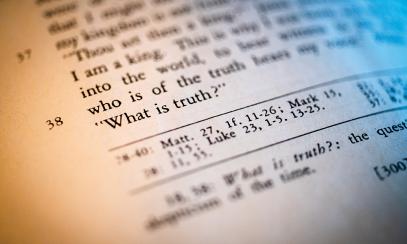
From Band-Aids to Prayers
In my therapy office, I often talk with parents wanting to help their grown children with difficulties in life. It’s a hard moment for every parent when their child reaches an age when the hurts can no longer be “kissed away.” The hurts have become more complex than a skinned knee or a stinging remark from a classmate. They might involve the child’s deeper sense of self-worth or even pain caused by serious sin. Facing their child in that moment, a parent can almost visualize the chasm forming between them, impeding their former ability to make it all better by simply applying a Band-Aid, giving a hug, or saying a few loving words.
In my therapy office, I often talk with parents wanting to help their grown children with difficulties in life. It’s a hard moment for every parent when their child reaches an age when the hurts can no longer be “kissed away.” The hurts have become more complex than a skinned knee or a stinging remark from a classmate. They might involve the child’s deeper sense of self-worth or even pain caused by serious sin. Facing their child in that moment, a parent can almost visualize the chasm forming between them, impeding their former ability to make it all better by simply applying a Band-Aid, giving a hug, or saying a few loving words.
This is even harder when the parent knows there is a serious divide between how they and their child think or believe. Using that scenario, let’s say an adult child opens up to their parent about something painful they are experiencing, and the parent believes that if their child would just change their thinking or their actions it would bring healing.
What is a parent to do?
Part of the answer to this question is to remember that if a child is old enough to be living out of the house, they have the God-given right to make decisions for themselves, unless these infringe on the rights of their parents.
Before giving their opinions via a loving lecture, it is prudent for a parent to ask themselves: “Is my child going to be open to what I am saying?” If that serious divide exists, then the answer might be, “No,” and a well-meaning lecture could further entrench the child in their painful situation.
An easy explanation of why this happens is that everyone struggles with pride. Letting go of how we think about something is hard, even when we are receiving new information from someone who loves us.
The other, and most important, part of the answer is that a parent should pray for the child. Of course, God doesn’t need that lecture about the child’s situation. God created them and loves them more than any human could imagine, which can be easy to forget when feeling desperate. Because of this, allow me to offer a simple, “straight to the heart of the matter” prayer written by Kyle Clement, a nationally known instructor of the Catholic laity: “May the light of Christ be on (name), so that they see themselves as the Heavenly Father sees them; and that I see them as the Heavenly Father sees them.”
I love telling people about this prayer because it is completely unselfish in its requests. In contrast, if I start telling the Lord about someone else’s situation, I might be trying to direct God to make the person into who I think they should be instead of who He created them to be.
Can a parent see things that might need changing in their adult child’s life? Absolutely! But we are reminded in 1 Corinthians 13:12 that, “At present, we see indistinctly, as in a mirror.” As a therapist, this verse makes me think about our tendency to see others as compared to that person we see in the mirror every day: ourselves. We must work on ourselves and trust God to work on others, even those we love the most. In doing this, we will practice the virtue of humility and become stronger in the virtue of charity, which as we know is both patient and kind.
Cathy Altonji is a therapist at Catholic Family Services in Huntsville. She has a master’s degree in social work and is a licensed independent clinical social worker certified in private independent practice.



